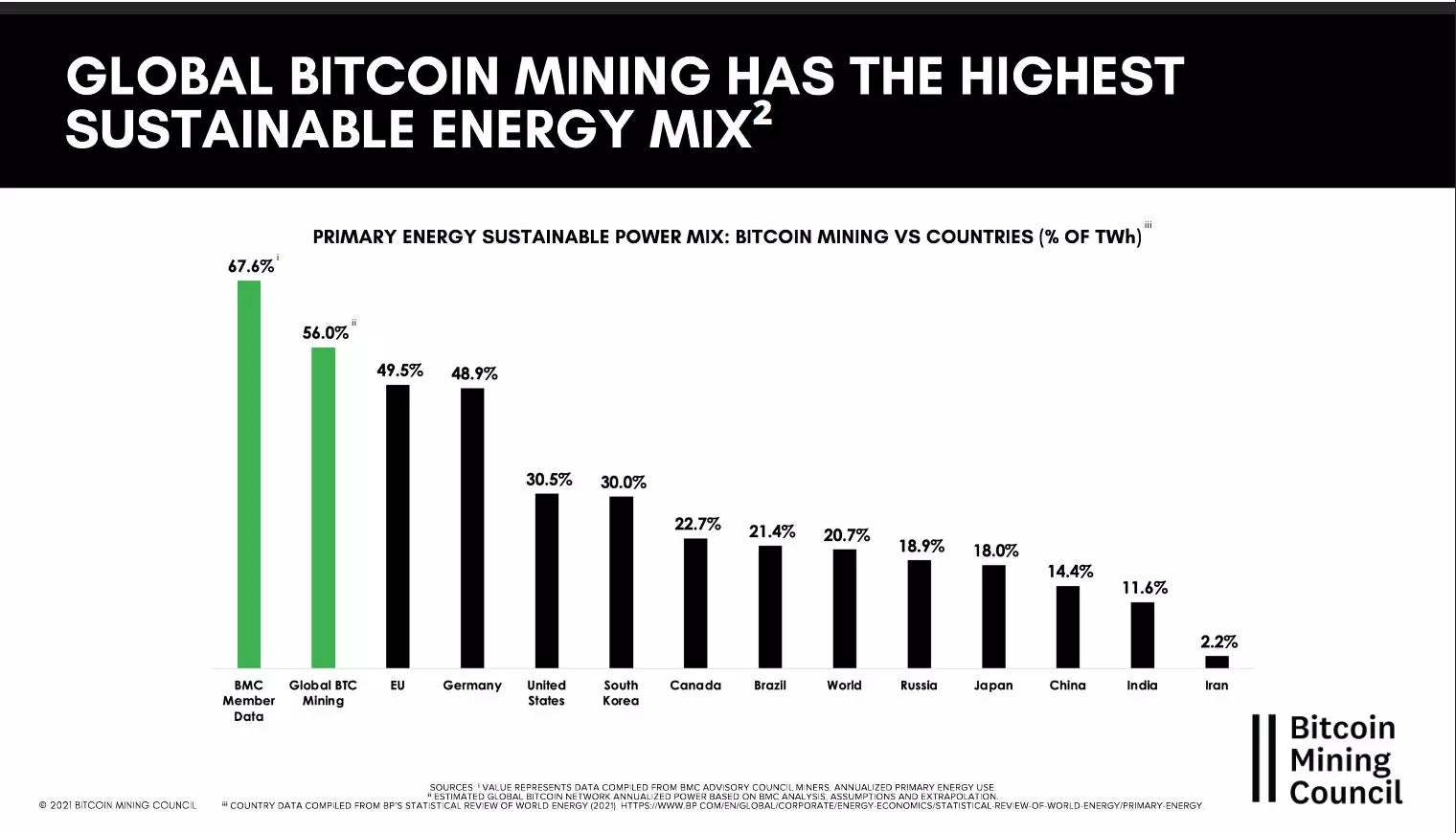Bitcoin Energy Consumption: Too High and Harmful! Is it really like that?

Introduction
How much energy does Bitcoin use? A question that has been hotly discussed for years. Especially when the Bitcoin price increases. The most recent increase in spring 2021 re -lived up to the debate about the sustainability of Bitcoin.
Usually these debates end in a fundamental discussion: Bitcoin is “far too volatile for a value reservation”, “failed as a means of payment”, “is used for criminal activities” ... then it says. If you look at how the introductions of other currencies or many far -reaching innovations ran, you will find that the controversies were often very similar.
Critics therefore claim that Bitcoin mining is far too energy-intensive and therefore harmful to the environment. Proponents, on the other hand, claim that the proof of work mechanism, which is based on the generation of new bitcoins, is an absolutely brilliant work. Who is right now? How energy-intensive is the Bitcoin network? And the benefit justifies this, or not?
A notice: Mining is the process in which transactions are verified on the blockchain. In order to verify new transactions, mining computers have to solve an extremely complex mathematical problem. This prevents hackers and others from abusing the system. In order for computers to solve these mathematical problems, an enormous amount of energy is required. As soon as a Bitcoin miner solves the problem, it will be rewarded with a transaction fee and newly shaped bitcoins. Bitcoin current consumption is also related to the robustness of the system. The more electricity the system has, the safer the values lying therein. For transactions of bitcoins, however, far less energy is needed than for mining new bitcoins.
Table of contents
- Motivation of the discussion
- How much energy does the Bitcoin network actually use?
- Bitcoin versus gold
- Bitcoin versus banking system
- How about the benefits of Bitcoin?
- How can we do Bitcoin small companies GUYA support?
- Conclusion
1. Motivation of the discussion
First of all, it should be said that the debates about the energy consumption of Bitcoin are often caused out of political motivation. There will always be people who consciously stage the high electricity consumption of Bitcoin. Just like there are people who defend him for ideological reasons. In order to get closer to the truth, it is advisable to put the emotions aside and to look at arguments rationally and data -controlled. You should also put the topic in a broader context. After all, there are more than enough technologies and systems that are not necessarily advantageous for the environment per se, but the benefits of which are then largely assumed.
2. How much energy does the Bitcoin network actually use?
The Cambridge Bitcoin ELECTRICITY CONSUMPTION INDEX has been measuring the electricity consumption of cryptocurrency since 2019 and estimates it to currently around 144 Terawatt hours (TWH) a year. Bitcoin thus accounts for 0.51 percent of global electricity production and 0.59 percent of global power consumption.
So the fact is: Bitcoin consumes as much energy as a small country. In the comparison with nation states, the electricity consumption of Bitcoin is 28th place between Ukraine (27th) and Argentina (29th).
That sounds alarming. However, reality is a bit more complex - and also more complicated. Because analogous to energy consumption, the value behind it should also be considered here. For comparison: GDP of Ukraine is around $ 150 billion. The value of all mined bitcoins is $ 940 billion.
3. Bitcoin versus gold
However, Bitcoin is not in competition with states, but is in competition with other assets such as the currencies issued by the central banks as banknotes and coins - or value preservatives such as gold. Due to comparable properties such as the scarcity (the absolute number of bitcoins is limited to 21 million, currently almost 17 million are in circulation), Bitcoin is often referred to as "digital gold".
Gold is also broken down industrially. And just like Bitcoin mining, the dismantling and production of precious metals also consume energy, cost money and produce garbage. As with Bitcoin mining, there is no guarantee of success with the gold ditch. However, the better the gold or bitcoin mining operation-the more powerful the tool or the computer-the higher the chance of success to come across gold or Bitcoin.
The breakdown of gold is also heavily dependent on electricity generated from fossil fuels. Last year, the World Gold Council proposed that the emissions of the gold sector should be reduced by 80 percent by 2050.

Global Bitcoin Mining has the highest renewable energy mix. The energy comparison with the individual countries is also interesting here. Source: Bitcoin Mining Council
According to Global Cryptoasset Benchmarking Study, 39 percent of Bitcoin energy consumption are won in a climate-neutral manner. Other sources even speak of 73 percent. The Bitcoin Mining Council estimates that the sustainable electricity mix for the Global mining has grown to 56 percent and thus represents one of the most sustainable industries worldwide. An analysis suggests that the gold mining is 50 times more expensive than Bitcoin mining and the operation of the Bitcoin network. And the production of gold for a single wedding ring alone causes 20 tons of garbage.
Sure, gold has many wonderful application cases, and market capitalization of gold over the tenfold of Bitcoin is also ten times. What should only be shown with this: Bitcoin to describe as badly by nature appears incomplete after this comparison.
4. Bitcoin versus banking system
Then there would be a comparison with the banking system. The numbers are very difficult to grasp here, but quite a few voices claim that the Bitcoin ecosystem consumes significantly less electricity and is far more efficient than the existing banking system, the infrastructure of which consists of branches, servers, control centers, transports, transports, etc.
According to Galaxy Digital, the banking industry has a consumption of over 260 TWh per year. Cathie Wood, the founder of the American investment company ARK Investment Management, says that the Bitcoin network consumes less than 10 percent of the energy that the banking system needs. In this context, it should be said fairly that the banking system (still) is (still) billions of people. In contrast, there are currently around 100 million people who have cryptocurrencies.
5. What about the benefit of Bitcoin?
Climate systems undoubtedly have their benefits. But also effects on the environment. There are over a billion air conditioners worldwide - one for every eighth person. Does that really need that? A complex question that is intertwined with our priorities as a society.
What should be said: As mentioned at the beginning, the whole discussions about the energy consumption should not be forgotten. It is easy to forget that energy is always used and compromises are made. Maybe that's why it is therefore worth taking a look at how everyone can benefit from using Bitcoin.
Because apart from speculation on the market, Bitcoin also makes life easier for many people. Bitcoin enables people worldwide to participate in the same monetary system. This can be an advantage in poorer, crisis -lined or totalitarian regions in order to make transactions decentralized, cross -border and without high fees.
Due to the strong devaluation of the Naira, many Nigerians flocked to Bitcoin. In 2020, Nigeria was 3rd place behind the USA and Russia in the crypto trade volume. Nigerians who work in wealthy countries use Bitcoin to make transfers to their family. Inflation is only one driver. For many, Bitcoin is so interesting because it protects against censorship, corruption, repression, inflation and capital control.
Venezuela has left seven million people since the protests against the Maduro government. Many of them send money from abroad via Bitcoin to their relatives in the country. According to Human Rights Foundation, around four billion people live in totalitarian regimens worldwide who use money as means of state surveillance and oppression.
Another factor that speaks for Bitcoin is that the energy consumption differs from the many other industries in that Bitcoin can be broken down anywhere where there is electricity and the Internet. Energy actually always has to be produced close to the end consumer - Bitcoin does not have this restriction. Mining can even be seen as a tool for the energy sector by creating a perfect application for fluctuating and excess energy. According to data from the World Bank and the International Energy Agency, around 2,200 TWh is lost due to inefficiencies and transport losses per year. Energy that can be converted into monetary values by mining.
6. How can Bitcoin small companies GUYA support?
This topic is particularly exciting and is therefore treated separately in our articles on decentralized autonomous organizations, or DAO in short.
Bitcoin enables complex processes to carry out so -called smart contracts thanks to the update Taproot Taproot Taproot, which has currently been added in 2023, and to save values such as documents as NFT or Ordinal. In the article "Daos - companies of the future"Or if you are in the Search dao enter.
7. Conclusion
Since cryptocurrencies and especially Bitcoin have gained importance and also gained value, the high energy consumption has become the focus of public discussions.
Whether you attribute Bitcoin & Co. to a legitimate claim to these resources initially depends heavily on the value that is subjectively attached to society. It also remains to be seen how the courses continue to develop. If the prices rise, energy consumption also increases.
If we also wait and see which benefits can be compared in the future, how the proportion of renewable energies develops and whether the energy sector can even be promoted with Bitcoin. Basically, Bitcoin to judge, but simply seems incorrect.
According to The Crypto Voices, Bitcoin is now the sixth largest monetary value in the world (excluding gold and silver). Only EU, Japan, USA, China and UK are in front of it. Such a status inevitably requires enormous amounts of energy. High energy consumption is not bad per se. People have always compromises for new technologies. So the idea should not be to consume less energy, but to supply the things that are good for us as a global community with more green energy.

















